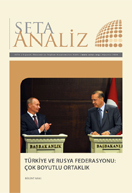The Gaza panel at this year's Davos meeting will be remembered as one of the most dramatic moments in the entire history of Davos. Turkish Prime Minister Recep Tayyip Erdoğan's face-to-face blasting of Israeli President Shimon Peres was unprecedented, as was his storming out of the meeting.
The gurus of world diplomacy found Erdoğan's attitude hard to swallow. But Erdoğan's point was clear: it is time to call the spade a spade. If no one has called the emperor naked before, it is their fault. This seems to be the logic behind Erdoğan's critical attitude toward Israel's recent war on Gaza and its overall policy toward the Palestinians. At the now infamous panel, Peres not only defended Israel and implicitly endorsed the killing of hundreds of women and children, but also accused Turkey (i.e., Erdoğan himself) of not knowing what went on. As he repeatedly turned to Erdoğan during his speech and pointed his finger at him, his body language became offensive and arrogant. This was nothing new for Peres, but it was the wrong sign to be giving to someone like Erdoğan. Erdoğan was cut off by the moderator, David Ignatius, with repeated taps on his shoulder -- and the rest is history. What should we make of this dramatic incident? Erdoğan's opponents fear that Turkey is in big trouble and will be punished by the big players in Washington and elsewhere. His supporters feel jubilant about the whole episode, praising him as the only political leader who can call a spade a spade. There are also those who feel that Turkey is going overboard and meddling in other people's business. Regardless of how one interprets it, the Davos incident represents a turning point in Erdoğan's political career. He had similar dramatic moments in domestic politics when, for instance, he scolded a farmer in Mersin and called a Kurdish lawyer from Diyarbakır a "liar." But never have we seen him unleash his true feelings as we saw in Davos. Was Erdoğan trying to send a message? Or was he simply acting out of pure emotion? From a purely diplomatic point of view, Erdoğan's reaction is more likely to cause concern than it is to bring comfort. But Erdoğan is not a diplomat. He is a political leader. His frustration does not simply show the limits of one man's patience, but underscores the boundaries of how much progress one can make with puppet diplomacy. The Palestinians and Arabs have been playing the "peace process game" for the last two decades. As a senior Palestinian and Fatah member told me recently, since the Oslo Process started the Palestinians have gotten practically nothing out of the negotiations. Before and after Yasser Arafat, they made every concession possible to meet Israel's demands, but got nowhere. Fatah cannot get anywhere by extending the olive branch to the Israelis. Hamas cannot get anywhere by firing rockets into Israel. Neither peaceful negotiations nor armed resistance is working against Israel's increasingly isolated and self-enclosed politics. In the meantime, Israel keeps building more settlements, grabbing more land, humiliating more Arabs and killing more Palestinians. So what is left for the Palestinians to do? What Erdoğan is saying is clear: If we are serious about peace, let's talk about it honestly and reckon with the ugly realities on the ground first. The corrupt and inept Arab leaders might be happy with the misery of the Palestinians because it gives them a comfort zone to maneuver domestically. Most of the Americans are clueless because they know only the Israeli side of the story, forgetting that there is never only one side to any story. Europeans are too lethargic and lack any strong vision. Like many Arabs, they are more interested in rebuilding what Israel destroys rather than stopping the destruction in the first place. Israeli hard-liners are proving themselves to be impossible to do honest business with. The recent Erdoğan-Olmert episode is a lesson not only for Turks, but for everyone. Erdoğan's reaction was directed not only at Peres, but at all of the ab
Erdoğan, Peres and the Unclothed Emperor
The Gaza panel at this year's Davos meeting will be remembered as one of the most dramatic moments in the entire history of Davos. Turkish Prime Minister Recep Tayyip Erdoğan's face-to-face blasting of Israeli President Shimon Peres was unprecedented, as was his storming out of the meeting.
Share
Tags »
Related Articles








